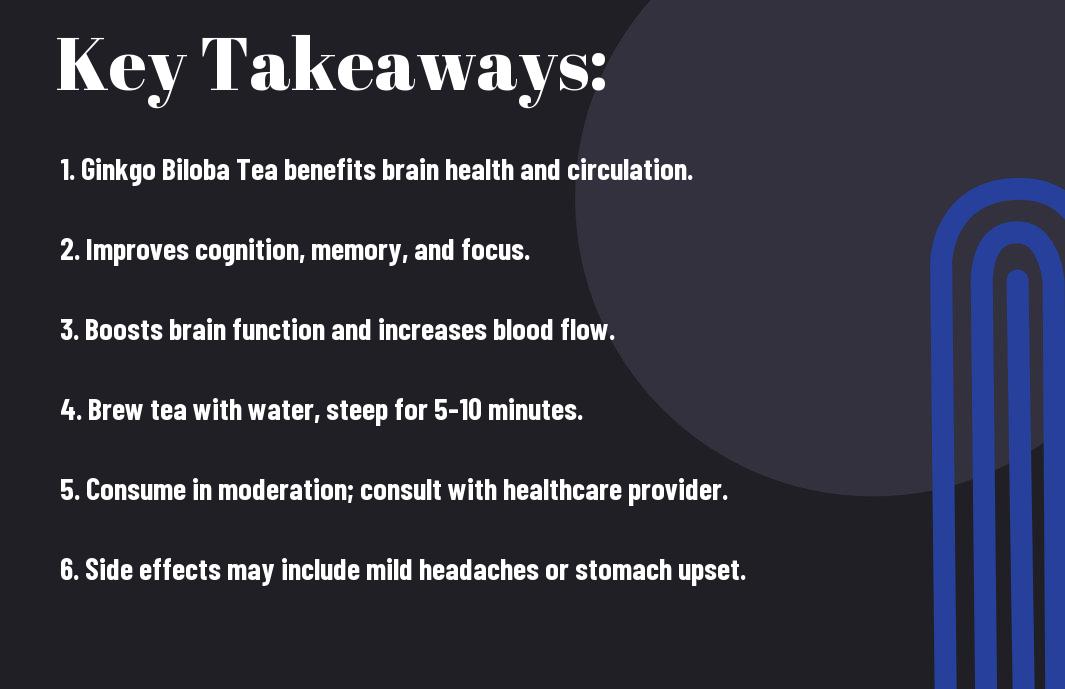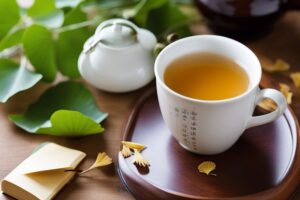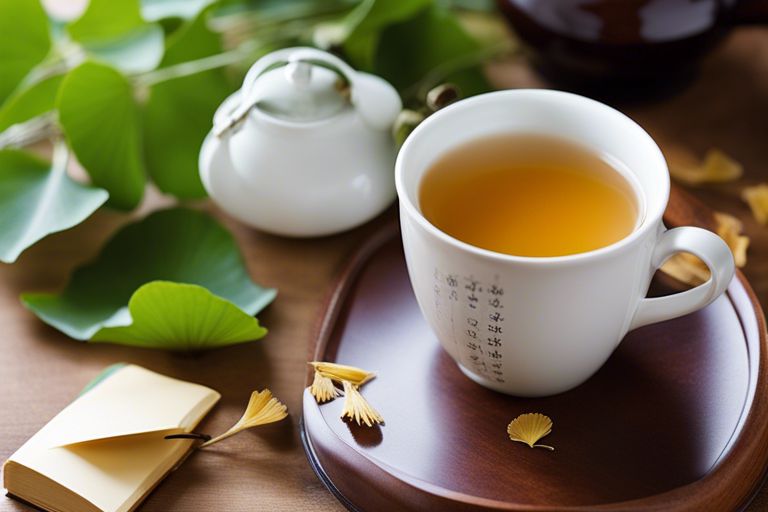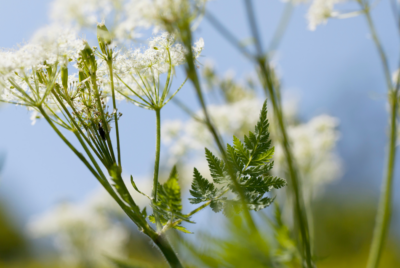Ginkgo Biloba Tea
Ginkgo Biloba Tea
Brain health is crucial for overall well-being, and Ginkgo Biloba tea is a popular herbal remedy known for its potential benefits. This informative blog post will probe into the benefits of Ginkgo Biloba tea. Also how it affects the brain, its positive impact on circulatory health, the proper way to prepare and consume this tea. We will also show you some potential side effects. Furthermore, we will compare Ginkgo Biloba tea with other herbal teas, share testimonials and personal experiences, and conclude with 5 frequently asked questions about this tea.

Key Takeaways:
- Benefits of Ginkgo Biloba Tea: Ginkgo biloba tea is known to improve cognitive function, memory, and concentration.
- Brain Health: Ginkgo biloba tea affects the brain by increasing blood flow, which can enhance cognitive function and protect against age-related decline.
- Circulatory Health: Ginkgo biloba tea can improve circulation, potentially benefiting heart health and reducing the risk of stroke.
- Preparation and Consumption: Properly preparing ginkgo biloba tea involves steeping the leaves in hot water for optimal benefits. It is recommended to consume it in moderation.
- Potential Side Effects: While generally safe, ginkgo biloba tea may cause side effects such as dizziness, nausea, or allergic reactions in some individuals.

Benefits of Ginkgo Biloba Tea: Unfolding the Wellness Secrets
Now, let’s dive into the exciting world of the benefits of Ginkgo Biloba tea! This ancient herbal remedy has been cherished for centuries for its various wellness advantages. One of the most prominent benefits of Ginkgo Biloba tea is its potential for cognitive enhancement and memory improvement.
Cognitive Enhancement and Memory Improvement
Enhancement: Ginkgo Biloba tea is believed to improve cognitive function by enhancing blood flow to the brain, which may help boost memory, focus, and overall mental clarity. Regular consumption of Ginkgo Biloba tea has been associated with better cognitive performance and increased alertness, making it a popular choice for those seeking natural ways to support their brain health.
Antioxidant Properties and Anti-inflammatory Effects
An: In addition to its cognitive benefits, Ginkgo Biloba tea is also prized for its antioxidant properties and anti-inflammatory effects. The antioxidants in Ginkgo Biloba tea help protect cells from damage caused by free radicals, reducing oxidative stress in the body. Furthermore, its anti-inflammatory effects may help alleviate symptoms of inflammation and promote overall well-being.
How Ginkgo Biloba Tea Affects the Brain: The Science Behind the Leaves
Blood Flow Enhancement and Neuroprotective Effects
For centuries, ginkgo biloba has been revered for its ability to enhance blood flow throughout the body, including the brain. The leaves of the ginkgo tree contain compounds that help to dilate blood vessels and improve circulation. When consumed as a tea, ginkgo biloba can help increase oxygen and nutrient delivery to the brain, which can enhance cognitive function and support overall brain health.
Impact on Neurotransmitters and Mental Clarity
Enhancement of neurotransmitters plays a crucial role in mental clarity and cognitive function. Ginkgo biloba tea has been shown to boost levels of dopamine and serotonin, two neurotransmitters involved in mood regulation and memory. By supporting these neurotransmitters, ginkgo biloba tea can help improve focus, concentration, and overall mental clarity.
To explore deeper into how ginkgo biloba tea impacts neurotransmitters, it’s important to note that dopamine is associated with feelings of pleasure and reward, while serotonin is linked to mood regulation and emotional well-being. By increasing the levels of these essential neurotransmitters, ginkgo biloba tea can promote a positive outlook and enhanced cognitive function.
Ginkgo Biloba Tea for Circulatory Health: A Heartwarming Tale

Not only does Ginkgo Biloba Tea offer a soothing and aromatic experience, but it also provides numerous benefits for blood circulation and cardiovascular health. The natural compounds found in Ginkgo Biloba are known to help dilate blood vessels, which can improve blood flow throughout the body. By enhancing circulation, this tea can support overall heart health and help maintain healthy blood pressure levels.
Advantages for Blood Circulation and Cardiovascular Health
Circulatory health is crucial for the proper functioning of our bodies, and Ginkgo Biloba Tea can play a significant role in supporting this essential system. Regular consumption of this tea may help reduce the risk of cardiovascular issues by promoting healthy blood flow and maintaining optimal circulation.
Connections Between Ginkgo Biloba Tea and Reduced Stroke Risk
Risk factors for strokes can be lowered with the consumption of Ginkgo Biloba Tea. Studies have shown that the anti-inflammatory and antioxidant properties of Ginkgo Biloba may help reduce the risk of strokes by preventing blood clot formation and improving overall cardiovascular health.
Health experts recommend incorporating Ginkgo Biloba Tea into your daily routine to not only enjoy its delightful flavor but also to potentially reduce your risk of experiencing a stroke. Bear in mind, always consult with a healthcare provider before adding any new herbal remedies to your wellness regimen.
Preparing Ginkgo Biloba Tea: Brewing Perfection
Selecting Quality Ginkgo Biloba Leaves
Biloba When preparing Ginkgo Biloba tea, it is essential to start with high-quality Ginkgo Biloba leaves. Look for leaves that are a vibrant green color and avoid any that appear discolored or have a musty smell. Choose organic Ginkgo Biloba leaves to ensure that your tea is free from pesticides and other harmful chemicals.
Step-by-Step Brewing Instructions for Optimal Taste and Benefits
Its important when brewing Ginkgo Biloba tea to use the correct water temperature and steeping time. This will maximize the flavor and benefits of the tea. Below is a simple guide to help you brew the perfect cup of Ginkgo Biloba tea:
| Water Temperature | Steeping Time |
| Boiling water | 3-5 minutes |
When brewing Ginkgo Biloba tea, it is important to use fresh, filtered water to avoid any unwanted flavors from tap water. Allow the tea to steep for the recommended time before straining and enjoying. Experiment with steeping times to find your preferred strength of Ginkgo Biloba tea.

Best Practices for Consuming Ginkgo Biloba Tea: Maximize Your Tea Time
Despite its numerous benefits, consuming Ginkgo Biloba Tea requires some attention to detail to ensure you get the most out of it. By following some best practices, you can optimize your experience with this powerful herbal tea.
Recommended Dosages and Optimal Times for Consumption
On your journey to enjoy the benefits of Ginkgo Biloba Tea, it is essential to pay attention to recommended dosages and optimal times for consumption. Experts suggest that a daily dose of 120-240 mg divided into 2-3 servings is generally safe for adults.
It is recommended to enjoy this tea in the morning or early afternoon. This way it may provide a gentle energy boost without interfering with your sleep patterns. Remember that consistency is key when it comes to herbal remedies. So make it a part of your daily routine for maximum benefits.
Combining Ginkgo Biloba Tea with Other Health Practices
With the rise in popularity of Ginkgo Biloba Tea, many individuals are exploring the option of combining this herbal remedy with other health practices to enhance its effects. Some people choose to pair this tea with meditation, yoga, or mindfulness exercises to promote overall well-being.
The combination of Ginkgo Biloba Tea with a healthy lifestyle, including regular exercise and a balanced diet, can work synergistically to support your physical and mental health goals. Incorporating these practices into your daily routine can lead to a more holistic approach to wellness.
Potential Side Effects of Ginkgo Biloba Tea: Being Well-informed
Despite the numerous benefits associated with Ginkgo Biloba Tea, be aware of potential side effects that may arise from consumption. While generally considered safe for most people, like any herbal remedy, there’s a possibility of adverse reactions in some individuals.
Recognizing Possible Adverse Reactions
Any unwanted effects that may occur after consuming Ginkgo Biloba Tea should be noted and addressed promptly. Some individuals may experience allergic reactions such as skin irritations, headaches, or digestive issues. It’s important to recognize these symptoms and consult with a healthcare provider if they persist or worsen.
Safe Consumption Guidelines to Mitigate Risks
Being mindful of the dosage and frequency of Ginkgo Biloba Tea intake can help mitigate potential risks. It’s recommended to start with a low dose and gradually increase as needed. So, individuals taking blood thinners or certain medications should consult with a healthcare professional before incorporating this tea into their routine to avoid any interactions.
Well-informed individuals are better equipped to monitor their bodies for any adverse reactions and adjust their consumption accordingly. By staying aware of the potential side effects and following safe consumption guidelines, you can continue to enjoy the benefits of Ginkgo Biloba Tea safely and effectively.
Comparing Ginkgo Biloba Tea with Other Herbal Teas: Finding Your Perfect Brew

Your journey to discovering the perfect herbal tea for your wellness routine can be both exciting and insightful. Understanding the unique qualities of different herbal teas, including Ginkgo Biloba, will help you make an informed choice that suits your needs.
Similarities and Differences in Health Benefits
Benefits: When comparing Ginkgo Biloba tea with other herbal teas, it’s important to note both the similarities and differences in their health benefits. Many herbal teas, like Ginkgo Biloba, are rich in antioxidants that help fight inflammation and promote overall well-being. The unique aspect of this tea lies in its ability to enhance cognitive function and support brain health, which sets it apart from other herbal teas.
Differences: While some herbal teas may focus on boosting immunity or aiding in digestion, Ginkgo Biloba tea stands out for its specific benefits for cognitive health. The potent flavonoids and terpenoids in Ginkgo Biloba contribute to improved memory, focus, and mental clarity. This makes it an excellent choice for those looking to support their brain function.
Making an Informed Choice for Your Wellness Routine
Health: With a plethora of herbal teas to choose from, selecting the right one for your wellness routine can seem overwhelming. It’s essential to consider your health goals and objectives when comparing Ginkgo Biloba tea with other herbal options. If you’re seeking to enhance cognitive function and memory, Ginkgo Biloba tea could be the perfect addition to your daily regimen.
Testimonials and Personal Experiences: Stories from Ginkgo Biloba Tea Enthusiasts
First-Hand Accounts of Benefits and Transformation

Many individuals have shared remarkable stories of how Ginkgo Biloba Tea has positively impacted their lives. From enhanced focus and improved memory to a heightened sense of alertness. Users have reported a range of cognitive benefits after incorporating this herbal tea into their daily wellness regimen. Some enthusiasts have even described a feeling of mental clarity and sharpness that they had not experienced before.
Tips and Recommendations from Regular Users
Tips from seasoned Ginkgo Biloba Tea drinkers can be invaluable for those looking to optimize their tea-drinking experience. Many recommend starting with a lower concentration and gradually increasing the dosage to assess tolerance levels. It’s also advised to consume the tea earlier in the day to avoid any potential interference with sleep patterns. The herbal tea is best enjoyed when steeped in hot water for approximately 5-10 minutes to extract the maximum benefits.
- Start with lower concentration
- Consume earlier in the day
- Steep in hot water for 5-10 minutes
Plus, enthusiasts suggest incorporating Ginkgo Biloba Tea into a balanced diet and active lifestyle to amplify its effects. The herbal tea can complement a healthy routine and promote overall well-being. To do this it should be consumed as part of a holistic approach to self-care. The potential benefits of this tea are worth exploring. But remember it’s important to listen to your body and consult with a healthcare provider if you have any concerns.
2 FAQs about Benefits of Ginkgo Biloba Tea
Top 2 Most Common Questions and Clear Answers
Anytime you try something new, questions are bound to arise. Here are the answers to the top 5 most common questions about Ginkgo Biloba Tea:
Are there any potential side effects from drinking Ginkgo Biloba Tea?
While Ginkgo Biloba Tea is generally safe for most people, some may experience mild side effects. Some of these include headaches or upset stomach. It’s always best to consult with a healthcare professional before adding any new herbal tea to your routine.
Additional Resources for Further Information
One excellent resource for further information on Ginkgo Biloba Tea is reputable herbal medicine books or websites. These sources provide in-depth knowledge about the history, benefits, and preparation of Ginkgo Biloba Tea.
Plus, if you’re looking for a more personalized experience, consider reaching out to a holistic health practitioner. Choose one that can give you tailored advice on incorporating Ginkgo Biloba Tea into your wellness routine.

Final Words on Benefits of Ginkgo Biloba Tea
To wrap up, Ginkgo Biloba tea is a popular herbal brew that offers a range of potential benefits for brain health and circulation. Its antioxidants and compounds may support cognitive function and overall well-being. By incorporating Ginkgo Biloba tea into your daily routine and following best practices, you can potentially enjoy its effects and promote your health in a natural way.
Remember to consult with a healthcare professional before adding Ginkgo Biloba tea to your routine, especially if you have existing health conditions or are taking medications. With proper preparation and moderation, this tea can be a soothing and beneficial addition to your herbal tea collection.
Discover the Hidden Health Benefits of Tarragon
Heal Your Gut with Slippery Elm – A Dietary Must- Have
Discover the Benefits Of Arnica – Natures Pain Reliever
How can CInnamon Control Blood Sugar Levels and Reduce Inflammation
Coriander – Your Digestive Aid and Anti-Inflammatory Superfood



